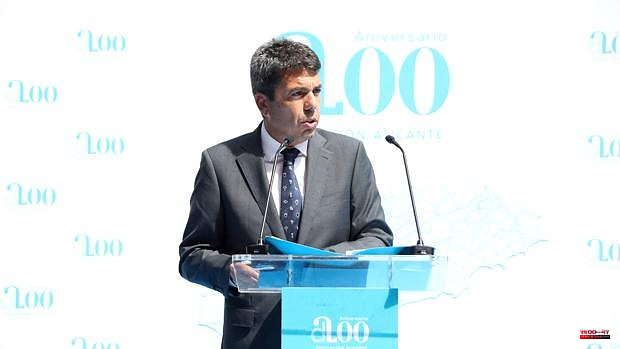The president of the Diputación de Alicante, Carlos Mazón, has presided over this morning in the gardens of the Provincial Palace the act with which the program begins with which this year the 200th anniversary of the Diputación de Alicante will be commemorated in which he has defended the role of this institution in supporting town councils, especially the smaller ones, while at the same time claiming "autonomy and freedom of action and decision against those who want to destroy them from within or from other institutions".
In addition, the Alicante leader has taken advantage of this meeting, which has brought together mayors and representatives of the social, cultural and economic fabric of the province, to defend the Tajo-Segura transfer and the arrival of water in our territory "because it is the main of our strengths, since it is part of the essence of a territory that is the garden of Europe”.
“The Tajo-Segura transfer is inalienable”, he stated, while defending that Alicante “is the only institution that has always been at the side of irrigators and farmers defending their interests. And in that fight we continue, stronger and more convinced than ever”.
During the ceremony, which was also joined by members of previous provincial corporations, regional and national deputies and senators, Mazón admitted that the greatest challenge facing 21st-century councils is demographics and highlighted, in this regard , that the Diputación de Alicante, through its investments and subsidies, "is a plan against depopulation itself".
"Most of our annual budget is allocated to small towns, which makes us a permanent cooperation fund, the administration that is most attentive to city councils and the one that resolves their demands more effectively and quickly," he said. indicated the Alicante leader, who has denied that the councils "are stagnant and static institutions, but rather agile and close proximity spaces, direct management centers that promote effective policies to strengthen and structure the territory."
For all this, he has criticized all those who question his existence. “Whoever is against the councils does not deserve to be in it, because it is an absurd and dangerous game to want to destroy and finish them from within or from other institutions that try to strangle our autonomy and freedom of action and decision, limiting our movements and suffocating our budget. ”, the Alicante leader has denounced.
On the other hand, Mazón has appealed for dialogue and consensus and has been especially "proud" of the agreements reached with all the political groups throughout this legislature and has claimed the right of the Provincial Council to "claim our legitimate recognition in the autonomous structure, to be respected and given our fit as a province and to listen to our demands and sensitivities”. At this point, he has called for fair funding and water for the province.
Finally, the president wanted to honor the hundred provincial corporations and presidents who have passed through the institution in the last 200 years and has had a special mention for Pedro Zaragoza Orts, who was mayor of Benidorm and president of the Alicante Provincial Council, since today coincides with the centenary of his birth.
On behalf of the Popular Group, the deputy for the Presidency and Economy, Eduardo Dolón, thanked the work carried out by all the officials and employees of the provincial institution, "who with their work help our municipalities every day, especially the smaller ones, turning the Diputación into the council of councils”.
Likewise, he has highlighted the economic effort made to attend to "all the requests that the mayors and city councils send us" and has estimated, in this sense, at one billion euros the investment promoted in this legislature alone, "of which 90 % has reached the municipalities and the remaining 10% to entities, non-profit institutions and business associations”.
From Ciudadanos, the other formation that makes up the government team together with the Popular Party, the first vice president and deputy for Culture, Julia Parra, has recognized during her speech that "diputaciones have been structuring the territories for 200 years, long before becoming fashionable the term vertebration. In this sense, she has pointed out that “when things work, you have to continue trusting them. History teaches us that too.”
As the deputy has pointed out, "the function of the provincial institution makes the treatment of the public towards the municipalities more equitable" and, among its primary functions, has highlighted "to ensure the quality and quantity of the services that its neighbors need ”, with special attention “to the 82 with less than 5,000 inhabitants who, due to their singularities, especially need this institution; it is a question of territorial solidarity”.
Parra has highlighted the responsibilities held by the two Cs deputies, with Javier Gutiérrez as spokesperson, both as part of the government team, and at the forefront of far-reaching responsibilities in terms of territorial cohesion such as Infrastructure and Assistance to municipalities, Culture and Transparency, in which "management and operation are being transformed with unprecedented commitments".
On behalf of the Socialist group, its spokesperson Toni Francés has also valued the support role of the Provincial Council to the municipalities, "who are the ones who, with their decisions, must mark the policies and objectives that must be promoted from the provincial institution." "The Diputación is a necessary and useful institution for the city councils of the province", insisted Francés, who has also positively valued the "important steps that have been taken in this legislature to improve the efficiency and effectiveness in the granting of subsidies to the municipalities. The defense of water resources, the improvement of municipal financing, depopulation or the price crisis are some of the challenges that the socialist leader has raised as more immediate.
Finally, from Compromís, Gerard Fullana has highlighted the work of the officials and technicians of the provincial institution "to put the towns and cities of Alicante at the center of attention" and has advocated "reducing the political muscle" in the provincial institution . "From Compromís we work so that the Valencian Government is more Alicante and that makes Alicante more Valencian", the nationalist spokesman concluded.
The string quartet of the ADDA Simfònica has been in charge of closing this commemorative event by performing both the anthem of the Valencian Community and that of Spain.
2












